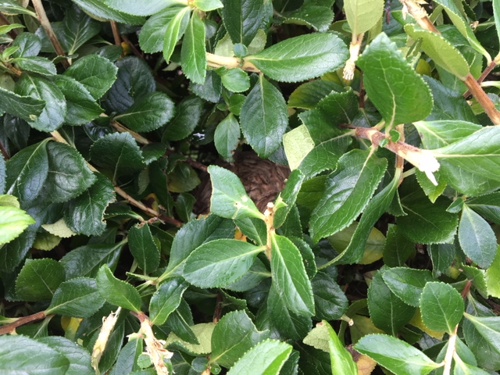Warning about asian hornets
Asian hornets can pose a threat to humans if disturbed. If you are stung, please heed the following advice.
A man was stung by an Asian Hornet on 24th August as he was trimming a hedge (the nest was just beneath the hedge and could not be seen- see photo below or log onto Jersey Bee Keepers Association Facebook site). He was allergic to bee stings and ended up being treated in hospital.

Please read through this information to help keep yourself safe, especially as the secondary nests are well established (30 found this year) and branchage is about to commence.
The extra precautions to take include:
1. View the States of Jersey web site so you can identify hornets and nests
2. Nests can be in roof spaces/eaves of houses and sheds, in trees, hedges and on the ground in brambles. The hornets are disturbed by any vibration. Before starting any work, inspect these areas for flying insects etc. (for example spend time looking along the hedge before trimming etc, look into trees and inspect areas prior to strimming).
3. Nests can also fall out of trees during high winds, so take care if you see hornets near the ground
If you spot an Asian Hornets’ nest or have any questions then please contact the Environment Department on 01534 441600.
What to do it you are stung.
Asian Hornets aren’t naturally aggressive towards humans, but they may sting if they feel threatened. If you are stung the recommendations are similar to any type of wasp sting:
• Remove the sting if it's still in the skin.
• Wash the affected area with soap and water.
• Apply a cold compress (a flannel or cloth cooled with cold water) or an ice pack to any swelling for at least 10 minutes.
• Raise the affected area if possible, as this can help reduce swelling.
• Avoid scratching the area, to reduce the risk of infection.
• Avoid traditional home remedies, such as vinegar and bicarbonate of soda, as they're unlikely to help.
The pain, swelling and itchiness can sometimes last a few days. Ask your pharmacist about over-the-counter treatments that can help, such as painkillers, creams and antihistamines.
When to get medical advice.
Contact your GP if:
• You're worried about a bite or sting
• Your symptoms don't start to improve within a few days or are getting worse
• You've been stung or bitten in your mouth or throat, or near your eyes
• A large area (around 10cm or more) around the bite becomes red and swollen
• You have symptoms of infection, such as pus, increasing pain, swelling or redness
• You have symptoms of fever, swollen glands and other flu-like symptoms
When to get emergency medical help.
Dial 999 for an ambulance immediately if you or someone else has a severe reaction, such as:
• Wheezing or difficulty breathing
• A swollen face, mouth or throat
• Nausea or vomiting
• A fast heart rate
• Dizziness or feeling faint
• Difficulty swallowing
• Loss of consciousness

